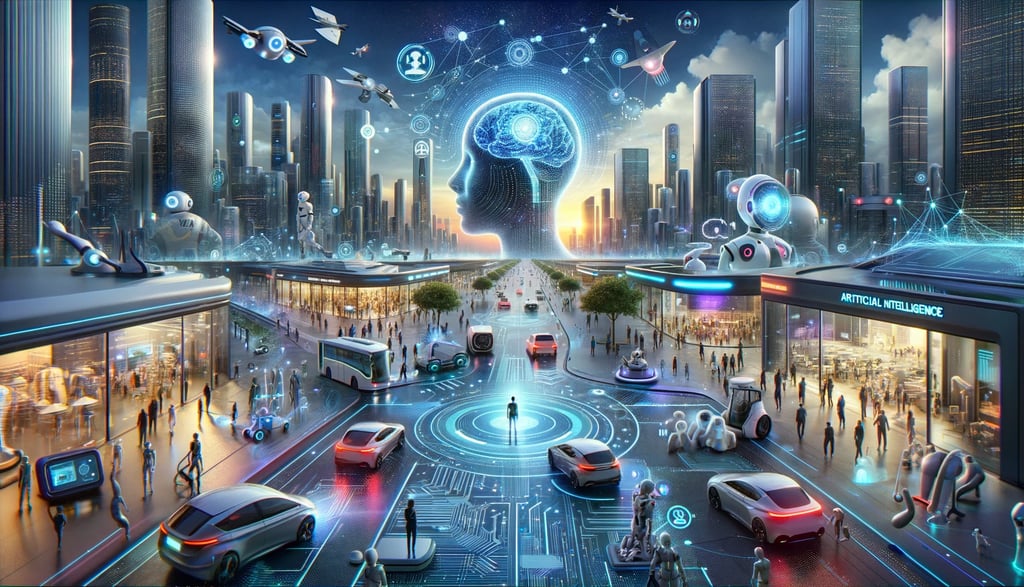
“The Listening Dark” - Now Available on Spotify!
Technological Tides - The Five Waves Shaping Our World
Embark on a riveting journey through "Technological Tides - The Five Waves Shaping Our World," an exploration of the transformative power of technology. From the revolutionary telegraph and telephone to the dawn of artificial intelligence, discover how each wave has redefined communication, reshaped society, and revolutionized our daily lives. This concise narrative uncovers the milestones of human ingenuity, the seamless web of global connectivity, and the promising horizon of AI. Dive into the story of how technology bridges vast distances, democratizes information, and crafts the fabric of our future. Get ready to be inspired by the past, present, and the boundless possibilities that await.
AIARTIFICIAL INTELLIGENCEGLOBAL COMMUNICATIONTECHNOLOGICAL REVOLUTIONSINTERNET ERAMOBILE TECHNOLOGYDIGITAL TRANSFORMATIONCOMPUTER REVOLUTION
Henri Hubert
2/12/20249 min read
Chapter 1: The First Wave – The Dawn of Modern Communication
Revolutionizing the World: The Telegraph and Telephone's Impact on Global Communication
In the annals of human history, few technological advancements have had as profound an impact on society as the first wave of telecommunication. This groundbreaking era, marked by the invention of the telegraph and the telephone, not only revolutionized the way we communicate but also fundamentally altered our perception of distance and time.
The Telegraph: Uniting Distant Lands
Our journey begins in the early 19th century with the advent of the telegraph. Imagine a world where messages that once took weeks to deliver could now be transmitted in mere minutes. This marvel of engineering, which initially used Morse code, became the first form of electrical communication. The telegraph connected continents, transformed international relations, and laid the foundation for a globally interconnected community.
Alexander Graham Bell and The Invention of the Telephone
The narrative takes an exciting turn with the entrance of Alexander Graham Bell, whose invention of the telephone in 1876 was nothing short of revolutionary. Bell, a figure synonymous with innovation, transformed the telegraph's dots and dashes into the human voice's warmth and nuance. His invention turned homes and businesses into nodes in a vast network of real-time, personal communication.
Milestones in Telecommunication
As we delve deeper, we encounter significant milestones that marked this era. From the first transatlantic telegraph cable connecting Europe and America to Bell's first successful telephone call, these moments symbolize human ingenuity's triumph over the barriers of distance. They exemplify how technology can shrink the vast expanse of our world into a tightly knit community.
The Global Impact
The impact of these advancements on global communication was seismic. The telegraph and telephone not only accelerated the pace of business, diplomacy, and news dissemination but also democratized information access. They fostered a newfound sense of closeness among distant communities, making the world feel smaller, more connected, and infinitely more accessible.
Conclusion
In conclusion, the first wave of telecommunication was not just about technological breakthroughs; it was about redefining human connection. The telegraph and telephone were not mere inventions; they were the harbingers of a new era in human history. They set the stage for a world where distance is no barrier to sharing ideas, emotions, and dreams, a legacy that continues to resonate in our modern, hyper-connected world.
Chapter 2: The Second Wave – The Computer Revolution
From Calculators to Computers: The Digital Revolution Transforming Our World
The second wave of technological advancements, marked by the rise of computers, is a saga of extraordinary innovation that reshaped every facet of human existence. This chapter delves into the fascinating evolution of computers, from rudimentary mechanical calculators to sophisticated digital systems that have become integral to our daily lives.
The Humble Beginnings
Our story begins with the early mechanical calculators, primitive yet groundbreaking devices that laid the groundwork for computational technology. These devices, though limited in capability, were the precursors to a revolution that would later engulf the world.
The Advent of Digital Computers
The narrative takes a leap into the mid-20th century with the development of the first digital computers. These machines, characterized by their ability to store and process information electronically, marked a significant departure from their mechanical ancestors. The invention of the digital computer opened up limitless possibilities, heralding an era of unprecedented computational power.
Alan Turing: The Architect of Modern Computing
Central to this revolution is the figure of Alan Turing, a pioneer whose contributions laid the foundations for modern computing. Turing's work during World War II, particularly his role in deciphering coded messages, not only had profound implications for the war but also for the future of computer science. His visionary ideas about artificial intelligence and computational theory continue to influence the field to this day.
The Personal Computer: A Revolution in Every Home
As we journey into the late 20th century, we witness the transformative impact of personal computers. These devices, once the preserve of businesses and academic institutions, became a common feature in homes, revolutionizing the way we work, learn, and play. The personal computer democratized access to information, unleashing a wave of creativity and innovation that continues to ripple through every sector of society.
The Impact on Industries, Education, and Daily Life
The role of computers in revolutionizing industries, education, and daily life cannot be overstated. From automating complex industrial processes to revolutionizing the educational landscape, computers have become the backbone of modern society. They have not only increased efficiency and productivity but also opened up new avenues for learning, entertainment, and personal growth.
Conclusion
In conclusion, the second wave of technological advancements, epitomized by the rise of computers, represents a monumental shift in human capability and understanding. The journey from mechanical calculators to personal computers is not just a story of technological progress; it is a testament to human ingenuity and the unrelenting pursuit of knowledge.


Chapter 3: The Third Wave – The Internet Era
Connecting the Globe: The Internet's Transformation of Society
In the tapestry of technological advancements, the third wave stands out as a pivotal moment in human history. This chapter delves into the era of the Internet - a period that redefined the boundaries of communication, information access, and commerce, effectively transforming the world into a closely-knit global village.
The Birth of the Internet: From ARPANET to Global Connectivity
Our journey into the Internet era begins with ARPANET, the precursor to the modern Internet. Developed in the late 1960s, ARPANET was initially a military project that evolved into a networking framework connecting universities and research centers. This groundbreaking project laid the foundation for the expansive, interconnected web we know today, marking the transition from isolated information systems to a global network.
Tim Berners-Lee and the World Wide Web
A pivotal character in this narrative is Tim Berners-Lee, whose invention of the World Wide Web in the late 1980s revolutionized the Internet. Berners-Lee's vision of a universally accessible information space transformed the Internet from a niche tool for researchers to a global phenomenon. The Web's introduction not only democratized information but also simplified its access and distribution, fostering an environment where anyone, anywhere, could share and seek knowledge.
Redefining Communication, Information Access, and Commerce
The impact of the Internet on communication is profound. Email, instant messaging, and social media have bridged geographical gaps, enabling real-time interactions across continents. In the realm of information access, the Internet has become an unparalleled resource, offering vast knowledge at our fingertips. Moreover, the digital marketplace, driven by e-commerce, has revolutionized the way we shop, making global products accessible from the comfort of our homes.
The Internet as a Global Village
The concept of the world as a global village finds its truest expression in the Internet era. This interconnected network has not only brought people closer but also fostered a sense of global community. From cultural exchanges to international collaborations, the Internet has become a melting pot of global ideas, cultures, and ideologies.
Conclusion
In conclusion, the third wave, marked by the advent of the Internet, represents a monumental shift in the way we interact, learn, and conduct business. It's an era that signifies the power of connectivity and the limitless possibilities that arise when the world comes together as one interconnected community.


Chapter 4: The Fourth Wave – The Mobile Technology Revolution
From Bulky Phones to Smart Devices: How Mobile Technology Redefined Our Lives
In the odyssey of technological advancements, the fourth wave - the era of mobile technology - stands as a testament to human ingenuity and adaptability. This chapter explores the remarkable journey from the first bulky mobile phones to the sleek, multifunctional smartphones of today, unraveling how this wave has become a cornerstone of our daily existence.
The Dawn of Mobile Phones
Our exploration begins in the late 20th century with the advent of the first mobile phones. These early devices were bulky, expensive, and limited in functionality, yet they represented a groundbreaking step towards mobility in communication. They symbolized freedom - the ability to communicate without the constraints of wires and fixed locations.
The Evolution to Smartphones
As we progress through the timeline, we witness an evolution that is nothing short of revolutionary: the transformation of mobile phones into smartphones. This shift wasn't just a change in design or capabilities; it was a complete reimagining of what a phone could be. Smartphones emerged as powerful computing devices, equipped with internet connectivity, touchscreens, and an array of apps that cater to every imaginable need.
Smartphones: A Hub of Daily Life
Today, smartphones have transcended their role as mere communication devices. They are our cameras, our music players, our GPS navigators, our digital wallets, and so much more. They have changed the way we interact, engage, and experience the world around us. The smartphone has enabled a level of connectivity and accessibility previously unimaginable, becoming an indispensable part of our daily lives.
Transforming Social Interactions and Information Access
Smartphones have revolutionized social interactions. With instant messaging, video calls, and social media apps, these devices have fostered relationships and connections across the globe. They have also democratized information access, providing ubiquitous connectivity to the internet's vast resources. Whether it's for learning, entertainment, or staying informed, smartphones have become our primary gateway to the digital world.
Conclusion
In conclusion, the fourth wave of mobile technology is not just about the evolution of devices; it's about a profound shift in our lifestyle and interactions. The journey from bulky mobile phones to today's multifunctional smartphones reflects a trajectory of relentless innovation and adaptation, reshaping how we navigate our lives in the digital age.


Chapter 5: The Fifth Wave – The Era of Artificial Intelligence
Navigating the Future: The Unstoppable Rise of Artificial Intelligence
As we embark on the exploration of the fifth and current wave in technological advancements, we delve into the realm of Artificial Intelligence (AI) - a field that stands at the forefront of modern innovation. This chapter illuminates AI's origins, its meteoric rise in recent years, and its transformative potential across various sectors, including healthcare, transportation, and finance.
The Genesis of AI
Our journey into AI begins with its conceptual origins. Born from the marriage of computer science and human cognitive studies, AI initially sought to replicate human intelligence in machines. The dream was to create systems that could learn, adapt, and solve problems autonomously. The evolution from theoretical models in the mid-20th century to today's practical applications highlights a path of relentless pursuit and extraordinary achievement.
The Rapid Advancements of AI
In recent years, AI has experienced explosive growth, driven by advancements in machine learning, data analytics, and computational power. This growth phase has seen AI evolve from a niche field of study to a cornerstone technology that is reshaping every aspect of our lives. The capabilities of AI systems have advanced dramatically, enabling them to perform complex tasks with precision and efficiency.
Transforming Industries and Everyday Life
AI's impact is far-reaching, revolutionizing industries and everyday life. In healthcare, AI-driven diagnostics and personalized treatment plans are setting new standards in patient care. In transportation, autonomous vehicles promise a future of safer, more efficient travel. In the world of finance, AI algorithms are transforming how we invest, manage risk, and interact with financial institutions.
Current Applications and Ethical Considerations
The current landscape of AI is rich with applications, from virtual assistants in our smartphones to sophisticated algorithms that power search engines and social media platforms. However, as we embrace these advancements, we also grapple with ethical considerations. Issues such as privacy, bias in AI algorithms, and the impact on employment demand thoughtful discussion and responsible management.
Looking Ahead: The Future of AI
As we gaze into the future, AI's potential continues to unfold in exciting and unpredictable ways. The prospects of AI in enhancing human capabilities, solving complex global challenges, and creating new frontiers in technology and science are immense. Yet, this journey also calls for a balanced approach, where innovation is coupled with ethical responsibility and societal well-being.
Conclusion
In conclusion, the fifth wave of artificial intelligence is not just a technological revolution; it is a pivotal chapter in the story of human progress. As we navigate this era, the fusion of AI with our daily lives promises a future replete with opportunities and challenges, demanding our best efforts in stewardship and innovation.





